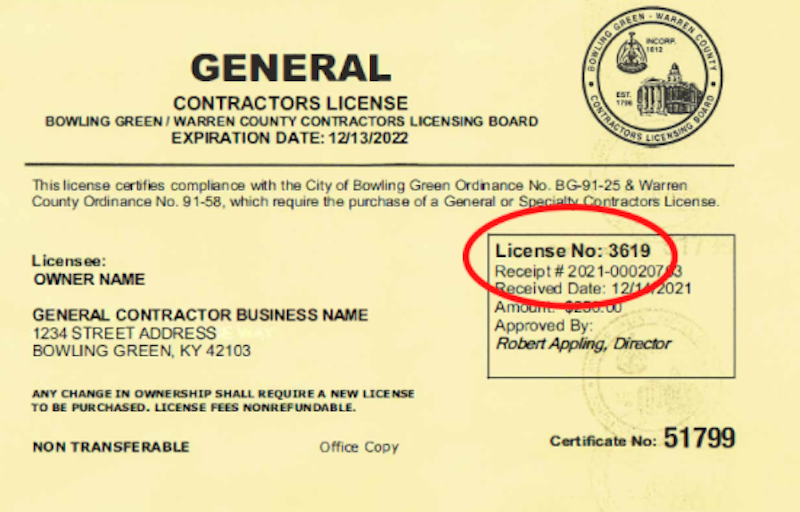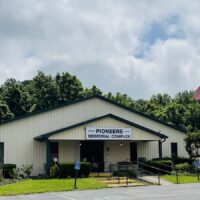Cleanup from the Dec. 10-11 tornadoes that tore through Bowling Green and parts of western Kentucky will take months.
While the work is just beginning, storm victims are being encouraged to guard against hiring unreliable contractors.

Telia Butler is the Downtown Development Coordinator for the city of Bowling Green. She told WKU Public Radio that all legitimate contractors are issued an official license, and before starting any repairs, the public should ask a contractor to present their license.
- RELATED: National Weather Service confirms Hopkinsville tornado
- RELATED: Kentucky launches website with tornado recovery resources
“All licensed contractors valid in Bowling Green and Warren County receive a license certificate that’s a yellow piece of paper that has their license number on it,” Butler said.
The license number is printed in the upper righthand corner of the certificate.
Butler advises storm victims to call the city/county Contractor’s Licensing Board at 270-781-3530 to verify that the number is valid. The public can also search the city’s online database to find the contractor’s license.
Butler said she’s not aware of any local complaints, but added they’re almost guaranteed following natural disasters. She said doing some homework ahead of hiring a contractor can prevent storm victims from encountering further losses.
“If you hire someone who is not licensed and give them money upfront, they could start the job, not finish, and head out of town, or they could do the job, but cut corners, and cause you more damage later,” Butler explained.
Home and business owners should be aware of out-of-town contractors going door-to-door to solicit work. Some may lack the proper licensing for your area. On Sunday, Kentucky Attorney General Daniel Cameron announced an emergency contractor registration program to assist storm victims in Mayfield and Graves County, two areas hardest hit by the tornadoes. The program requires contractors to register with the AG’s office and be issued placards, which must be displayed at their job sites and in their vehicles, prior to doing any work.
The Kentucky Attorney General’s Office office offers the following tips to avoid contractor-related scams:
- Contact your insurance company. If you are insured, discuss your policy coverage and filing requirements with your insurance company. Ask your adjuster for an estimate for repair costs. Be sure to save receipts for food, temporary lodging, and other expenses covered by your policy. Ask your insurance company to recommend reputable contractors to assist with repairs.
- Research contractors or repair companies and get more than one estimate. Search for contractors on BBB.org, get a reference from friends or family, and check with your local government agency responsible for registering or licensing contractors. Be sure to gather more than one estimate.
- Resist high-pressure sales tactics. Scammers often offer “special pricing” if you hire them on the spot. Do not feel forced to make a hasty decision to hire an unknown contractor. Be proactive in researching and selecting a contractor instead of reacting to sales calls or door-to-door pitches.
- Beware of contractors who claim to be “FEMA Certified,” represent FEMA, or mention that FEMA gave them your name. FEMA neither certifies nor endorses private-sector contractors. If you get a call informing you that you are eligible for a FEMA disaster assistance program, do not provide any personal or banking information over the phone.
- Do not pay a contractor or business upfront for their services.
- Do not sign insurance checks over to a contractor. Be sure to get an invoice from your contractor and pay them directly, preferably with a credit card, so that charges may be disputed, if necessary. Review contracts carefully, and do not sign documents that give a contractor rights to your insurance claims.
Potential scams should be reported locally, as well as to the Kentucky Attorney General’s Office at ag.ky.gov/scams.






